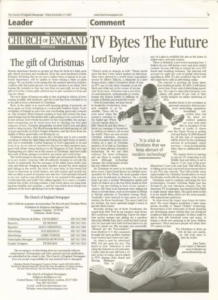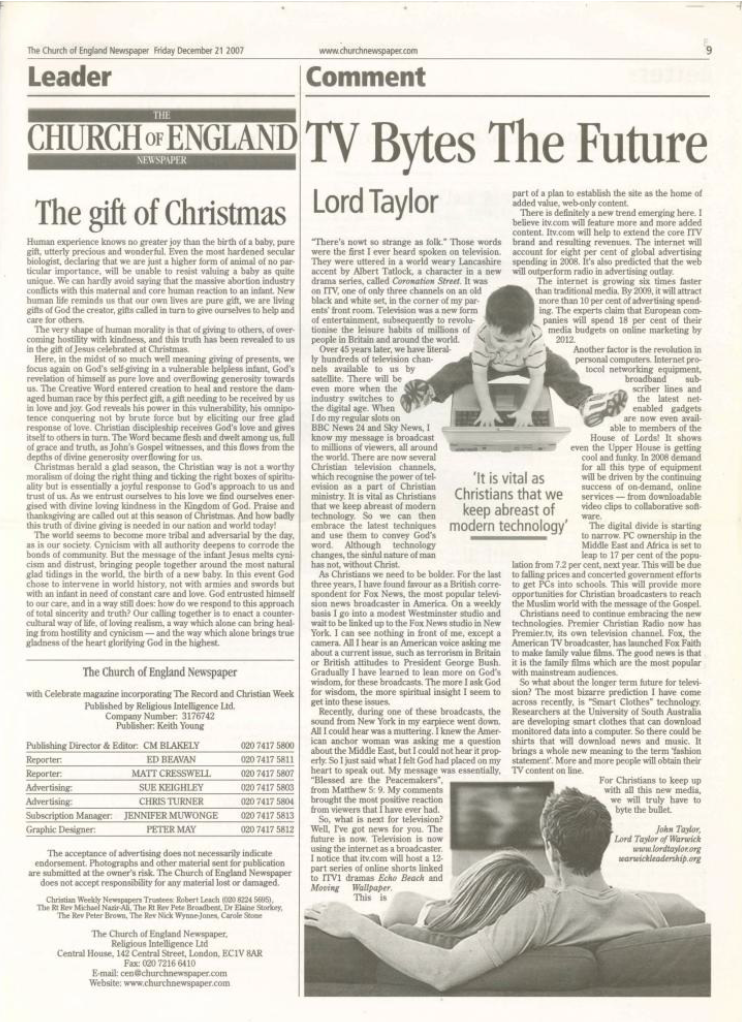Church of England Article By Lord Taylor of Warwick

“There’s nowt so strange as folk.” Those words were the first I ever heard spoken on television. They were uttered in a world weary Lancashire accent by Albert Tatlock, a character in a new drama series, called Coronation Street. It was on ITV, one of only three channels on an old black and white set, in the corner of my partners’ front room. Television was a new form of entertainment, subsequently to revolutionise the leisure habits of millions of people in Britain and around the world.
Over 45 years later, we have literally hundreds of television channels available to us by satellite. There will be even more when the industry switches to the digital age. When I do my regular slots on BBC News 24 and Sky News, I know my message is broadcast to millions of viewers, all around the world. There are now several Christian television channels, which recognise the power of television as a part of Christian ministry. It is vital as Christians that we keep abreast of modern technology. So we can then embrace the latest techniques and use them to convey God’s word. Although technology changes, the sinful nature of man has not, without Christ.
As Christians we need to be bolder. For the last three years, I have found favour as a British correspondent for Fox News, the most popular television news broadcaster in America. On a weekly basis I go into a modest Westminster studio and wait to be linked up to the Fox News studio in New York. I can see nothing in front of me, except a camera. All I hear is an American voice asking me about a current issue, such as terrorism in Britain or British attitudes to President George Bush. Gradually I have learned to lean more on God’s wisdom, for these broadcasts. The more I ask God for wisdom, the more spiritual insight I seem to get into these issues.
Recently, during one of these broadcasts, the sound from New York in my earpiece went down. All I could hear was a muttering. I knew the American anchor woman was asking me a question about the Middle East, but I could not hear it properly. So I just said what I felt God had placed on my heart to speak out. My message was essentially, “Blessed are the Peacemakers“, from Matthew 5: 9. My comments brought the most positive reaction from viewers that I have ever had.
So, what is next for television? Well, I’ve got news for you. The future is now. Television is now using the internet as a broadcaster. I notice that itv.com will host a 12-part series of online shorts linked to ITV1 dramas Echo Beach and Moving Wallpaper. This is part of a plan to establish the site as the home of added value, web-only content.
There is definitely a new trend emerging here. I believe itv.com will feature more and more added content. Itv.com will help to extend the core ITV brand and resulting revenues. The internet will account for eight per cent of global advertising spending in 2008. It’s also predicted that the web will outperform radio in advertising outlay.
The internet is growing six times faster than traditional media. By 2009, it will attract more than 10 per cent of advertising spending. The experts claim that European companies will spend 18 per cent of their media budgets on online marketing by 2012.
Another factor is the revolution is personal computers. Internet protocol networking equipment broadband subscriber lines and the latest net-enabled gadgets are now even available to members of the House of Lords! It shows even the Upper House is getting cool and funky. In 2008 demand for all this type of equipment will be driven by the continuing success of on-demand, online services – from downloadable video clips to collaborative software.
 The digital divide is starting to narrow. PC ownership in the Middle East and Africa is set to leap to 17 per cent of the population from 7.2 per cent, next year. This will be due to falling prices and concerted government efforts to get PCs into schools. This will provide more opportunities for Christian broadcasters to reach the Muslim world with the message of the Gospel.
The digital divide is starting to narrow. PC ownership in the Middle East and Africa is set to leap to 17 per cent of the population from 7.2 per cent, next year. This will be due to falling prices and concerted government efforts to get PCs into schools. This will provide more opportunities for Christian broadcasters to reach the Muslim world with the message of the Gospel.
Christians need to continue embracing the new technologies. Premier Christian Radio now has Premier.tv, its own television channel. Fox, the American TV broadcaster, has launched Fox Faith to make family value films. The good news is that it is the family films which are the most popular with mainstream audiences.
So what about the longer term future for television? The most bizarre prediction I have come across recently is “Smart Clothes” technology. Researchers at the University of South Australia are developing smart clothes that can download monitored data into a computer. So there could be shirts that will download news and music. It brings a whole new meaning to the term ‘fashion statement. More and more people will obtain their TV content on line.
For Christians to keep up with all this new media, we will truly have to byte the bullet.
